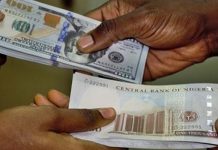There are indications that banks are cashing-in heavily on the recent spike of the Monetary Policy Rates, MPR, by the Monetary Policy Committee, MPC, of the Central Bank of Nigeria, CBN.
This emerged as the money market activities closed at the weekend, with a record N1.2 trillion over subscription to the Nigerian Treasury Bills, NTB.
The MPR at 14 per cent would give higher returns on investments in fixed income and government securities, with a near zero risk compared to other financial market investments and lendings to other sectors of the economy, Vanguard reports.
The subscription rates for the instruments, last week, ranged from 17–18 per cent. Bank The investments in NTB were also coming at the backdrop of N256 billion mopped up by the apex bank in its open market operation, OMO, a development which treasury dealers said indicated that CBN’s policy was pro-government securities.
They also said the policy helped reduce demand pressure on foreign exchange market while safeguarding both the exchange rate and the external reserves.
However, developments in the inter-bank foreign exchange market, last weekend, indicated a renewed pressure on the exchange rate as demands appeared to be heavily outstripping supply, a situation which forced the apex bank to intervene with supplies twice last week.
In spite of the intervention, naira depreciated significantly in the inter-bank spot market, closing at N332.1/USD1.0, weekend, down from N318.9/USD1.0 previous weekend.
Also, the huge cash flow to the government securities, according to the analysts, has led to starving of funds to other sectors of the economy, especially the manufacturing sector as banks now prefer trading in fixed income money market instruments where yields have risen recently with little or no risk.
Prime lending rates across banks have since gone beyond 20 per cent with other lending rates trending above 30 per cent in the past two weeks.













